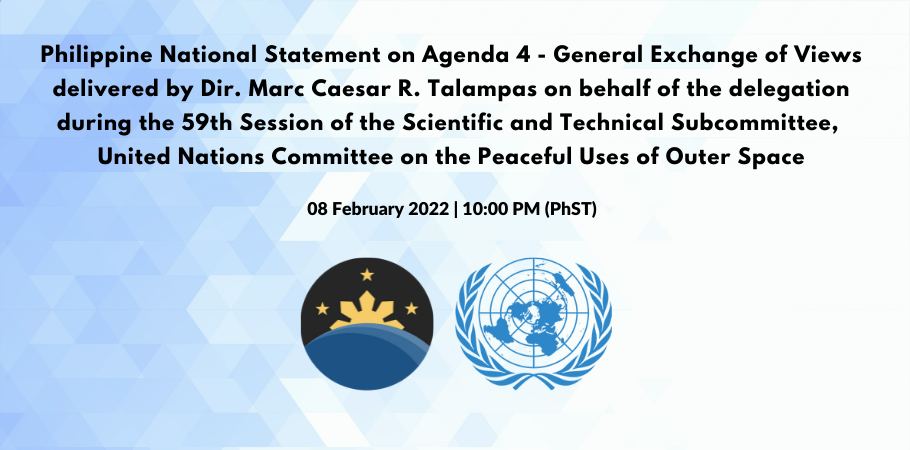59TH SESSION OF THE SCIENTIFIC AND TECHNICAL SUBCOMMITTEE OF THE
UNITED NATIONS COMMITTEE ON THE PEACEFUL USES OF OUTER SPACE
PHILIPPINE NATIONAL STATEMENT
AGENDA ITEM NO. 4 “GENERAL EXCHANGE OF VIEWS”
08 FEBRUARY 2022 | 11 AM – 1 PM CET | VIA INTERPREFY
delivered by
DR. MARC CAESAR R. TALAMPAS
DIRECTOR, SPACE TECHNOLOGY MISSIONS AND SYSTEMS BUREAU
PHILIPPINE SPACE AGENCY (PhilSA)

Mr. Chair,
On behalf of the Philippine delegation, I have the pleasure to extend our congratulations to you on your election. Our delegation is assured that under your leadership and guidance, the Subcommittee will be able to accomplish its substantive work in promoting and ensuring the peaceful uses of outer space.
Our delegation also expresses our congratulations and gratitude to Dr. Natalia ARCHINARD of Switzerland for her able leadership and guidance in the past two (2) years, especially under these unprecedented circumstances and challenges due to the pandemic, and likewise to Director Simonetta Di Pippo and the Secretariat for the excellent arrangements made for this Session.
We also wish to take this opportunity to welcome the new members of the Committee: Angola, Bangladesh, Kuwait, Panama, and Slovenia.
Mr. Chair and distinguished delegates, 2021 was a remarkable year for our space activities.
In October, the Philippines successfully launched our first, local university-built cube satellites: Maya-3 and Maya-4 – developed by eight Filipino scholars with the support of the Philippine government and the Kyushu Institute of Technology in Japan. Another batch of local scholars is set to launch two new cube satellites, Maya-5 and Maya-6, this 2022.
Last August, the Philippines also announced the development of the country’s biggest satellite to date – the Multispectral Unit for Land Assessment or MULA – to be developed under our flagship program, Build, Build, Build in Space. MULA will enable the Philippines to better respond to key challenges through Earth observation and space data by providing assistance in ensuring agricultural productivity, environmental integrity, and support to disaster risk management and mitigation.
Investment in the national space program is partly driven by the Philippines’ recognition of the many benefits it continues to derive from space data. To learn more about our space data mobilization efforts, I take the pleasure to invite everyone to our technical presentations on February 14 titled “Monitoring mangrove forests in the Philippines using Remote Sensing” and on February 15 titled “Typhoon Rai damage assessment using Sentinel-1 SAR and UNOSAT/UNITAR data”.
PhilSA is scheduled to publish its 2021 Annual Report in the 1st quarter of 2022 and it will be made publicly available on our website at philsa.gov.ph.
Mr. Chair and distinguished delegates,
The world continues to experience economic and social disruption brought by the COVID-19 pandemic. Our individual and collective efforts to mitigate the impact of this crisis through space technology and applications prove the importance and ever-growing value of space in the critical sectors of society and in our daily lives.
As such, the Philippines considers the preservation of space for peaceful uses as a matter of national importance, guided by the principles of long-term sustainability, equitable access, and international cooperation. The Philippine Space Agency or PhilSA is at the forefront of these activities, supported by the Philippine Space Council.
For 2022, PhilSA will embark on the Inclusive SSTA Knowhow Utilization, Exchange, and Localization Activities or ISKUELA, our national know-how transfer and training program. ISKUELA shall complement our Key Development Areas, ongoing activities, and future plans by:
1) increasing public support, awareness, interest, and appreciation for space technology and applications;
2) contributing to the development of human capital in space; and 3) fostering science, technology, and innovation culture for space in society.
Alongside this thrust, we continue to actively support multilateral efforts and engage in bilateral activities on the peaceful uses of outer space.
In particular, space debris and its proliferation continues to be a significant threat. We are of the view that effectively addressing this issue would require ensuring the long-term sustainability of space activities and encouraging norms that promote responsible behavior in space as a critical area of cooperation and action for the global space community. The 21 LTS Guidelines is one concrete step and we encourage all to consider its voluntary implementation and help developing countries to do the same through capacity-building.
Furthermore, the Philippines fully supports the work of the Working Group on the LTS. We hope that the Working Group can reach a consensus soon regarding its terms of reference, methods of work, and work plan, and we look forward to its substantive discussions.
Our delegation also welcomes the agenda on “General exchange of views on dark and quiet skies for science and society”. We are of the view that the discussions under this agenda item will be beneficial to the scientific community, especially on the discourse regarding the impact of mega-constellations on astronomy and other space activities.
Finally, the Philippines welcomes with great pleasure the decision of the General Assembly to adopt the Space2030 Agenda.
In conclusion, Mr. Chair, the Philippines assures the Subcommittee and the Secretariat of its full support and commitment to our shared endeavors and to the proceedings of this Session.
Thank you very much.
— END —




